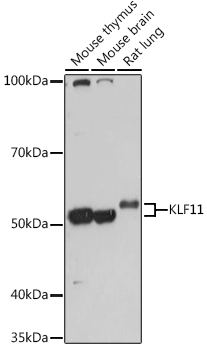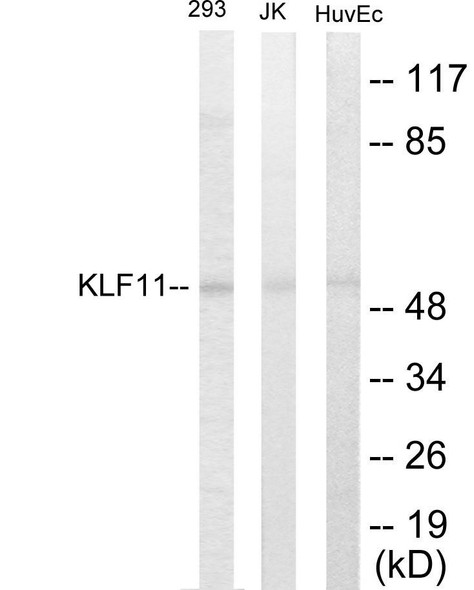Cell Biology Antibodies 15
Anti-KLF11 Antibody (CAB18659)
- SKU:
- CAB18659
- Product Type:
- Antibody
- Reactivity:
- Mouse
- Reactivity:
- Rat
- Host Species:
- Rabbit
- Isotype:
- IgG
- Research Area:
- Cell Biology
Description
| Antibody Name: | Anti-KLF11 Antibody |
| Antibody SKU: | CAB18659 |
| Antibody Size: | 20uL, 50uL, 100uL |
| Application: | WB |
| Reactivity: | Mouse, Rat |
| Host Species: | Rabbit |
| Immunogen: | Recombinant protein of human KLF11. |
| Application: | WB |
| Recommended Dilution: | WB 1:500 - 1:2000 |
| Reactivity: | Mouse, Rat |
| Positive Samples: | mouse thymus, mouse brain, rat lung |
| Immunogen: | Recombinant protein of human KLF11. |
| Purification Method: | Affinity purification |
| Storage Buffer: | Store at -20°C. Avoid freeze / thaw cycles. Buffer: PBS with 0.02% sodium azide, 50% glycerol, pH7.3. |
| Isotype: | IgG |
| Sequence: | Email for sequence |
| Gene ID: | 8462 |
| Uniprot: | O14901 |
| Cellular Location: | |
| Calculated MW: | |
| Observed MW: | 55kDa |
| Synonyms: | |
| Background: |
| UniProt Protein Function: | TIEG2: Transcription factor. Activates the epsilon- and gamma- globin gene promoters and, to a much lower degree, the beta-globin gene and represses promoters containing SP1-like binding inhibiting cell growth. Represses transcription of SMAD7 which enhances TGF-beta signaling. Induces apoptosis. Defects in KLF11 are the cause of maturity-onset diabetes of the young type 7 (MODY7). MODY is a form of diabetes that is characterized by an autosomal dominant mode of inheritance, onset in childhood or early adulthood (usually before 25 years of age), a primary defect in insulin secretion and frequent insulin-independence at the beginning of the disease. Belongs to the Sp1 C2H2-type zinc-finger protein family. 2 isoforms of the human protein are produced by alternative splicing. |
| UniProt Protein Details: | Protein type:DNA-binding; C2H2-type zinc finger protein; Transcription factor Chromosomal Location of Human Ortholog: 2p25 Molecular Function:protein binding; transcription factor activity Biological Process: G1/S-specific transcription in mitotic cell cycle; negative regulation of cell proliferation; negative regulation of transcription from RNA polymerase II promoter; positive regulation of apoptosis; transcription from RNA polymerase II promoter Disease: Maturity-onset Diabetes Of The Young, Type 7 |
| NCBI Summary: | The protein encoded by this gene is a zinc finger transcription factor that binds to SP1-like sequences in epsilon- and gamma-globin gene promoters. This binding inhibits cell growth and causes apoptosis. Defects in this gene are a cause of maturity-onset diabetes of the young type 7 (MODY7). Three transcript variants encoding two different isoforms have been found for this gene. [provided by RefSeq, Apr 2010] |
| UniProt Code: | O14901 |
| NCBI GenInfo Identifier: | 11387048 |
| NCBI Gene ID: | 8462 |
| NCBI Accession: | O14901.2 |
| UniProt Secondary Accession: | O14901,Q9EPF4, B4DZE7, |
| UniProt Related Accession: | O14901 |
| Molecular Weight: | 53,329 Da |
| NCBI Full Name: | Krueppel-like factor 11 |
| NCBI Synonym Full Names: | Kruppel like factor 11 |
| NCBI Official Symbol: | KLF11 |
| NCBI Official Synonym Symbols: | FKLF; FKLF1; MODY7; TIEG2; Tieg3 |
| NCBI Protein Information: | Krueppel-like factor 11 |
| UniProt Protein Name: | Krueppel-like factor 11 |
| UniProt Synonym Protein Names: | Transforming growth factor-beta-inducible early growth response protein 2; TGFB-inducible early growth response protein 2; TIEG-2 |
| Protein Family: | Krueppel-like factor |
| UniProt Gene Name: | KLF11 |
| UniProt Entry Name: | KLF11_HUMAN |







